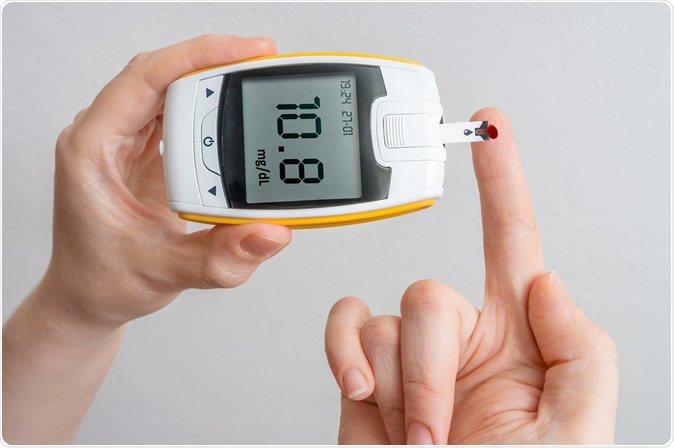High blood sugar can cause serious complications if it is not appropriately controlled. Type 2 diabetes is a chronic disease that occurs when blood glucose is too high due to the body’s inability to make enough insulin.
Before a person’s condition progresses to full-blown type 2 diabetes, he will have prediabetes, a condition wherein the blood sugar is higher than usual but not high enough to be diagnosed as diabetes.
In the United Kingdom, nearly two million people have prediabetes, which means they are at a high risk of developing diabetes within five years.
Despite the increasing number of prediabetics, studies show that lifestyle modifications can reduce the risk by as much as 40 to 70 percent. Though the new data and figures are tied to type 2 diabetes, which is associated with obesity, it is not the same as type 1 diabetes, which is an autoimmune disorder.

Measuring glucose level in blood. Image Credit: Vchal / Shutterstock
Alarming numbers
The NHS figures show that 1,969,610 people consulted with a physician due to non-diabetic hyperglycemia, a condition predisposing a person to type 2 diabetes. Health experts pinpoint to obesity as the culprit in the sharp rise of prediabetes cases.
The new data comes as the NHS speeds up efforts to treat, prevent, and put the disease in remission, as part of the NHS Long Term Plan.
According to estimates, the growing figures of diabetes patients could lead to 39,000 extra people suffering a heart attack in the next 15 years, and more than 50,000 experiencing a stroke. Further, the numbers indicate that there is one in six hospital beds occupied now by a person with diabetes.
The extent of the problem may be greater as the world is facing a growing obesity crisis, exposing millions of more people to the condition. The NHS plans to identify people at high risk of diabetes in the U.K., supporting them to have a healthier lifestyle.
Just like type 2 diabetes, prediabetes or non-diabetic hyperglycemia is preventable, and its progression can be slowed down. Being proactive with one’s health by taking simple steps to live a healthier lifestyle is the key to preventing the development of diabetes. This way, complications linked to diabetes can be prevented, which can end up costing a hefty amount of money and thousands of more lives.
“As these stark figures show it is wrong to think that the obesity and diabetes crisis is limited to those in middle and old age – there around 115,000 younger people suffering Type 2 diabetes or at risk of developing the condition,” Professor Jonathan Valabhji, NHS national clinical director for obesity and diabetes, said in a statement.
“The NHS Long Term Plan sets out the part we are playing to tackle the situation including piloting low-calorie diets to achieve Type 2 diabetes remission and doubling capacity of our world-leading NHS Diabetes Prevention Programme that can prevent people developing in the first place,” he added.
Signs you might have prediabetes
Having prediabetes is an alarming situation, and early detection is crucial. It is essential to know the signs and symptoms of the condition to report abnormalities before it is too late immediately.
Though many individuals with prediabetes do not have any signs and symptoms, they can manifest increased thirst, excessive hunger, frequent urination, blurred vision, and fatigue. Other symptoms may include abdominal pain, unintentional weight loss, recurrent infections such as cystitis, skin infections, and thrush, and fruity breath.
A possible sign of increased blood sugar levels in prediabetes is darkened skin in some parts of the body, mostly in the neck, elbows, knuckles, knees, and armpits.
How to manage blood sugar levels
Prediabetes is preventable, even with small lifestyle changes. First off, it is important to change one’s diet by avoiding foods that may make sugar levels spike, like sugary drinks and sweet desserts. Also, prediabetics are advised to engage in regular exercise, manage one’s weight, eating a healthy and well-balanced diet, and refraining from practicing a sedentary lifestyle.
Even with small steps, people can address the problems of increasing type 2 diabetes cases. Lifestyle changes are important drivers for a healthy weight loss and maintaining a normal blood sugar level.
Type 2 diabetes is a chronic and long-lasting disease, which has been linked to a wide range of complications, including heart attack, stroke, kidney problems,